七年级下册Unit 7 复习资料
七年级下册英语unit7知识点总结

七年级下册英语unit7知识点总结Unit 7的主要内容是关于地理和旅游方面的词汇及句型。
在这个单元里,我们将学习如何询问地点、问路、谈论交通工具、描述旅游景点并提出建议等。
一、地点询问地点:1. Excuse me, where is the …? (对不起,请问……在哪里?)指路:2. Go straight on. (一直直走)3. Turn left/right. (向左/右转)4. It’s on your left/right. (在你的左边/右边)二、交通交通工具:2. bus (公共汽车)3. taxi (出租车)4. bike (自行车)5. subway (地铁)交通工具的用法:1. take the train/bus/subway (乘坐火车/公共汽车/地铁)2. catch a taxi (打出租车)3. ride a bike (骑自行车)三、景点旅游景点:1. museum (博物馆)2. park (公园)3. beach (海滩)5. river (河流)描述旅游景点:1. It’s a beautiful/interesting place. (这是一个美丽/有趣的地方)2. There are lots of things to see/do here. (这里有很多东西可以看/做)3. It’s worth a visit. (值得一游)提出建议:1. Why don’t we …? (为什么不……?)2. We could … (我们可以……)3. How about …? (……怎么样?)本单元的语法重点为情态动词should和can的用法,学生需要掌握其肯定、否定和疑问句形式的构成及用法。
1. should/can/must + 动词原形2. should not/cannot/must not + 动词原形3. 询问意愿:Can/Will you …? / Would you like to …?总结:正如以上所述,七年级下册英语unit7主要是涉及到了生活中的地理和旅游类的词汇和句型,包括询问地点、问路、谈论交通工具、描述旅游景点并提出建议等。
人教版七年级下册英语期末复习:Unit 7-Unit 12 各单元语法知识点复习提纲(全面!)
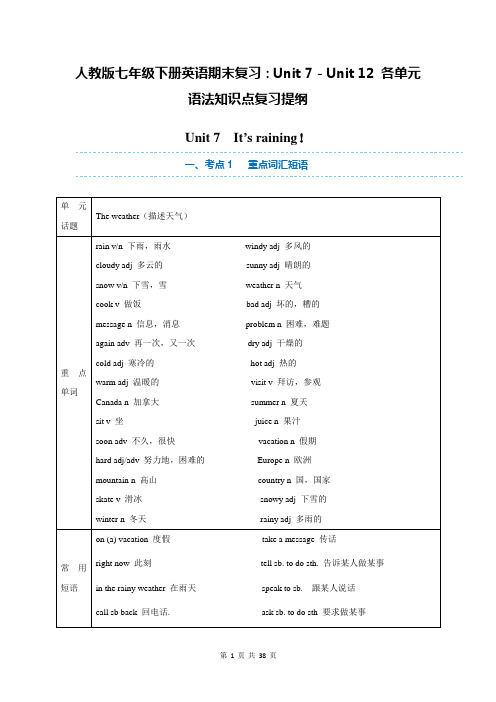
人教版七年级下册英语期末复习:Unit 7-Unit 12 各单元语法知识点复习提纲Unit 7 It’s raining!一、考点1 重点词汇短语1 messagemessage为可数名词,意为“消息,信息”,take a message for sb.“为某人捎个口信”。
拓展:give sb. a message 捎信给某人,leave a message 留口信,get the message 明白对方的意思。
Can I take a message for him?当某人发现要找的人不在或接电话的人发现打电话者要找的人不在时,常用此语2 could 情态动词意为“能,可以“,表示请求许可,在语气上比can委婉客气,但这种句式的肯定回答用can。
Could you just tell him to call me back?3 call及物动词,意为“打电话给”。
call sb. (up) “打电话给某人”,call sb. at +电话号码,意为“拨打……找某人”。
拓展:call 是一个多义词,call sb 可表示“叫醒某人,呼唤某人”;give sb. a call 给某人打电话。
4 back副词“回来,回原处,向后”;call sb. back给某人回个电话。
【即学即练】I’ll _____you _____.我将给你回电话。
5 visit此处用作及物动词,意为“拜访,探望”,后接表示人的名词或代词。
visit还可意为“参观,游览”,后接表示地点的名词。
拓展:visit还可用作可数名词,意为“访问,参观,拜访。
be on a visit to ... “正在访问/参观……”。
visitor参观者,游览者,游客。
I’m having a great time visiting my aunt in Canada._____ my grandparents every year at Christmas.我每年圣诞节都去探望我的祖父母。
人教版英语七下unit7单词、知识梳理、词汇句式精讲
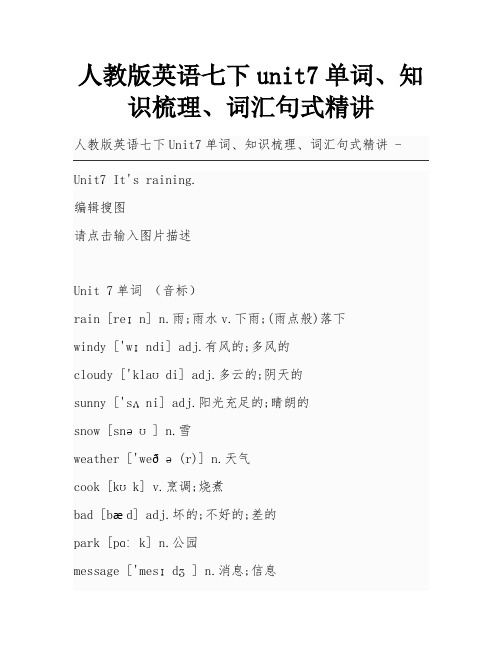
人教版英语七下unit7单词、知识梳理、词汇句式精讲Unit7 It's raining.编辑搜图请点击输入图片描述Unit 7单词(音标)rain [reɪn] n.雨;雨水v.下雨;(雨点般)落下windy ['wɪndi] adj.有风的;多风的cloudy ['klaʊdi] adj.多云的;阴天的sunny ['sʌni] adj.阳光充足的;睛朗的snow [snəʊ] n.雪weather ['weðə(r)] n.天气cook [kʊk] v.烹调;烧煮bad [bæd] adj.坏的;不好的;差的park [pɑːk] n.公园message ['mesɪdʒ] n.消息;信息him [hɪm] pron.他(he的宾格)could [kə d aux.可以;能;可能;can的过去式back [bæk] n.后面adj.向后的;后面的problem ['prɒbləm] n.问题;难题again [ə'ɡen] adv.再;又dry [draɪ] adj.干的;干燥的cold [kəʊld] adj.冷的;寒冷的hot [hɒt] adj.热的;辣的warm [wɔːm] adj.温暖的;暖和的visit ['vɪzɪt] v.拜访;参观Canada ['kænədə] n.加拿大summer ['sʌmə(r)] n.夏天;夏季sit [sɪt] v.坐juice [dʒuːs] n.果汁soon [suːn] adv.不久;很快vacation [və'keɪʃn] n.假期;休假hard [hɑːd] adj.硬的;困难的Europe ['jʊərəp] n.欧洲;欧盟mountain ['maʊntən] n..山;山脉;高山country ['kʌntri] n.国家;乡村skate [skeɪt] v.溜冰;滑冰snowy ['snəʊi] adj.多雪的winter ['wɪntə(r)] n.冬季;冬天Russian ['rʌʃn] adj.俄国的;俄国人的;俄语的snowman ['snəʊmæn] n.雪人rainy ['reɪni] adj.多雨的;下雨的Unit7 知识梳理【重点短语】1.How is the weather...?=What’s the weather like...? 天气怎么样?the rainy weather 在雨天3.talk about the weather with friends 和朋友谈论天气4.play puter games 玩电脑游戏5.watch TV 看电视6.How’s it going? 一切还好么?7.not bad 不坏,不错8. at the park= in the park 在公园9.sound like 听起来像10.have a good time 玩得开心;过得愉快11.study at sb’s home 在某人的家中学习12. take a message for sb. 为某人带消息13. tell sb. to do sth. 告诉某人做某事14. call sb. back (给某人)回电话15. no problem 没问题16. do one’s homework 做某人的作业17. right now 现在;立即;马上18. study English 学习英语19. have a great time doing 开心做某事20. summer school 暑期学习班21. visit some of my old friends 拜访我的一些老朋友22. be happy to do sth. 高兴做某事23. sit by the pool 坐在游泳池边24. drink orange juice 喝橙汁25. summer vacation 暑假26. study hard 努力学习27. be on vacation 在度假28. write to sb. 给某人写信29. in your country 在你的国家30. next month 下个月31. for three hours 三个小时32. wear hats 戴帽子33. take a photo of sb. 给某人照相34. speak to sb. 给某人谈话【重点句型】1. Hello,Rick speaking.喂,我是里克。
人教七年级英语下册 Unit 7 It’s raining. 知识点复习
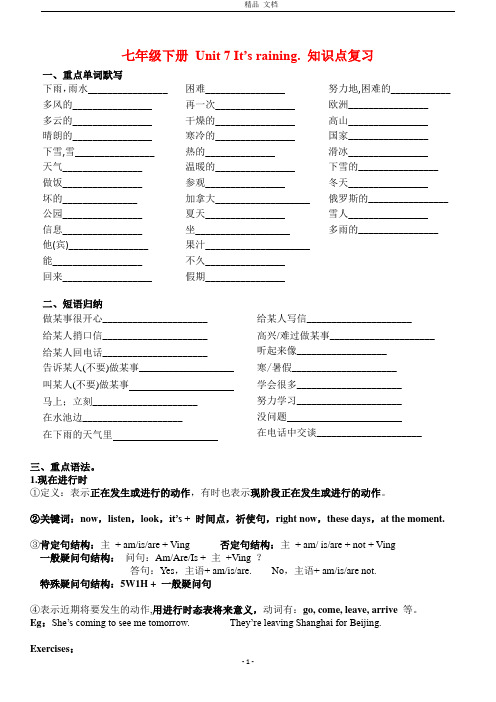
七年级下册Unit 7 It’s raining. 知识点复习一、重点单词默写下雨,雨水________________ 多风的________________多云的________________晴朗的________________下雪,雪________________天气________________做饭________________坏的_______________公园________________信息________________他(宾)________________能__________________回来__________________ 困难________________再一次________________干燥的________________寒冷的________________热的______________温暖的________________参观________________加拿大___________________夏天________________坐___________________果汁_____________________不久________________假期________________努力地,困难的____________欧洲________________高山________________国家________________滑冰________________下雪的________________冬天________________俄罗斯的________________雪人________________多雨的________________二、短语归纳做某事很开心_____________________给某人捎口信_____________________给某人回电话_____________________告诉某人(不要)做某事___________________ 叫某人(不要)做某事马上;立刻_____________________在水池边____________________在下雨的天气里给某人写信_____________________高兴/难过做某事_____________________ 听起来像__________________寒/暑假_____________________学会很多_____________________努力学习_____________________没问题在电话中交谈_____________________三、重点语法。
七年级下册英语unit7仁爱版知识点

七年级下册英语unit7仁爱版知识点Unit 7主要介绍了购物和做家务的相关语言知识。
以下是本单元的重点知识:
一、购物语言
1.询问价格和折扣:
- How much is it?(这个多少钱?)
- Is it on sale?(打折吗?)
- What's the discount?(有多少折扣?)
2.询问购物需求:
- Can I help you?(需要帮忙吗?)
- What size/color do you need?(你需要什么尺码/颜色?)
- What do you want to buy?(你想买什么?)
3.支付和找零:
- How do you want to pay?(你想用什么方式支付?)- Here's your change.(这是找给您的钱)
二、家务语言
1. 做家务的动词:
- sweep(扫地)
- mop(拖地)
- vacuum(吸尘)
- wipe(擦拭)
- dust(擦灰尘)
- clean(清洁)
- wash(洗)
- iron(熨烫)
2. 做家务的时间:
- on weekends(在周末)
- in the morning(早上)
- after school/work(放学/下班后)
- before bedtime(睡觉前)
3. 表示强调的副词:
- really(真的)
- very(非常)
- extremely(极其)
以上是本单元的重点知识,掌握上述语言知识可以帮助你更好地与他人交流。
希望你能够认真学习,在日常生活中灵活运用。
译林版英语七年级下册第七单元Unit7重要知识点汇总期末复习
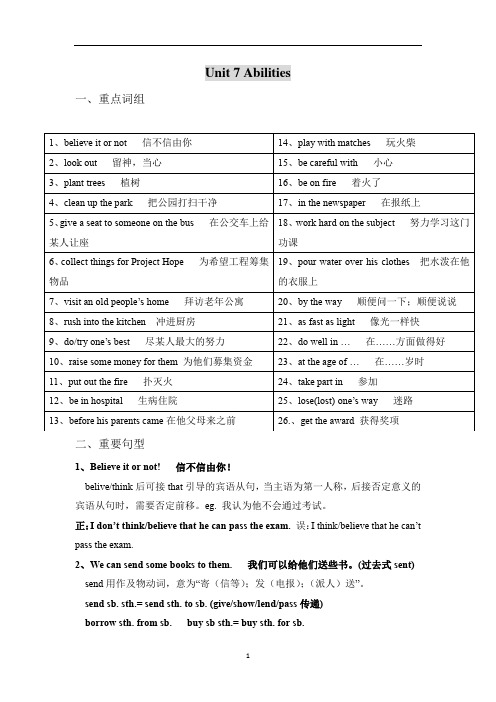
Unit 7 Abilities一、重点词组二、重要句型1、Believe it or not! 信不信由你!belive/think后可接that引导的宾语从句,当主语为第一人称,后接否定意义的宾语从句时,需要否定前移。
eg. 我认为他不会通过考试。
正:I don’t think/believe that he can pass the exam.误:I think/believe that he can’t pass the exam.2、We can send some books to them. 我们可以给他们送些书。
(过去式sent) send用作及物动词,意为“寄(信等);发(电报);(派人)送”。
send sb. sth.= send sth. to sb. (give/show/lend/pass传递)borrow sth. from sb. buy sb sth.= buy sth. for sb.拓展:①send up 发射①send for (派人去)请来3、Some children are not even able to pay for school. 一些孩子甚至不能付上学的钱。
able形容词,意为“有能力的;能干的”。
如:Your father is an able man.be able to 能;会。
相当于can/could,但be able to 有一般将来时。
sb. pay (sb.) for sth. 某人付给(某人)钱买某物过去式paidsb. spend +时间/金钱(in)doing sth./ on(doing) sth. 某人花费时间、金钱做某事。
It takes sb. some time to do sth. 做某事花费了某人多长时间。
sth. cost sb.+ 金钱某物花了某人多少钱4、He was brave enough to save his neighbour from a fire.他足够勇敢将他的邻居从火中救了出来。
七年级下册人教版unit7知识点
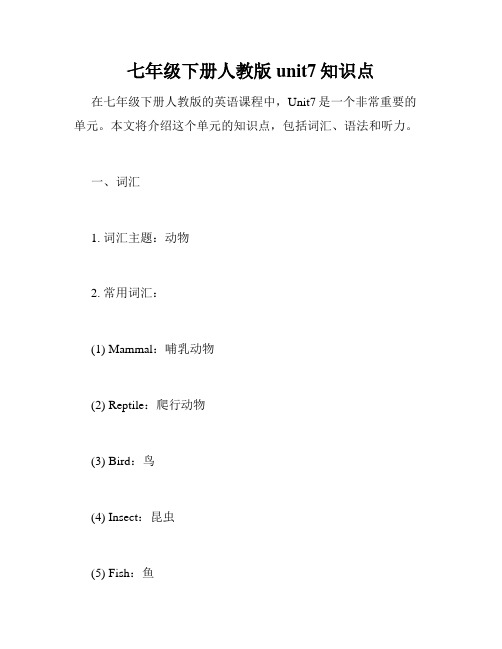
七年级下册人教版unit7知识点在七年级下册人教版的英语课程中,Unit7是一个非常重要的单元。
本文将介绍这个单元的知识点,包括词汇、语法和听力。
一、词汇1. 词汇主题:动物2. 常用词汇:(1) Mammal:哺乳动物(2) Reptile:爬行动物(3) Bird:鸟(4) Insect:昆虫(5) Fish:鱼(6) Pet:宠物(7) Wild animal:野生动物(8) Zoo:动物园(9) Feed:喂养(10) Habitat:栖息地3. 词汇搭配:(1) Have/take care of:照顾(2) Look after:照料(3) Be afraid of:害怕(4) Care about:关心(5) Be interested in:对……感兴趣(6) Be crazy about:热爱二、语法1. There be结构There be结构是英语中很常用的一种句型,意思是“有”。
其基本形式为:There be + 主语(单数/复数)+ 地点/位置。
例如:There is a dog in the park.(公园里有一只狗。
)There are three cats in the box.(盒子里有三只猫。
)2. 一般现在时一般现在时是我们日常生活中常用的时态,表示现在的状态或行为。
其基本形式为:主语 + 动词原形。
例如:I like dogs.(我喜欢狗。
)He often goes to the zoo.(他经常去动物园。
)3. 物主代词物主代词用于表示所属或拥有关系,主要有以下几个:(1) My:我的(2) Your:你的(3) His:他的(4) Her:她的(5) Its:它的(6) Our:我们的(7) Their:他们的例如:This is my cat.(这是我的猫。
)That is his dog.(那是他的狗。
)三、听力1. 听力主题本单元的听力主题是关于动物园的介绍和动物的描述。
人教版七年级英语下册Unit 7单元考点知识汇总

人教版七年级英语下册Unit 7单元考点知识汇总Unit 7 It’s raining!1.询问天气的表达方式:①----How’s the weather (in Beijing)?(北京的)天气怎么样----It’s a raining/sunny day. It’s raining.②-----What’s the weather like (in Beijing)(北京的)天气怎么样?----It’s windy.2. play computer games玩电子游戏3. ----How’s it/ everything going?最近怎么样?(询问某人近况如何)----Great!/Not bad!/Terrible? 太好了/还不错/糟糕极了!4. I am playing basketball with some friends at the park .(1)In/ at the park在公园里(2)with sb. 和某人在一起5. take a message for sb(him)给某人捎信leave a message to sb(him)给人留言6. Could you just tell him to call me back? 你能让他给我回电话吗?(1)call sb back:给某人回电话call sb. up: 给某人回电话(2)tell sb(not)to do sth 告诉某人(不)去做某事7. You are having a good time.你们玩的很开心啊!have a good time=have fun =enjoy oneself8. 打电话用语汇总:●拨打对方电话时的用语。
【例】(1)Could I speak to Jim, please? 请找吉姆接电话。
(2)Hello, is Kate in?喂. 凯特在吗?(3)Hello, is that Bruce?喂. 你是布鲁斯吗?(4)Hello, this is John Speaking. Can I talk to Zhang Hua?喂. 我是约翰. 我可以和张华讲话吗?●接电话时的常用语。
七年级下册英语unit7知识点归纳
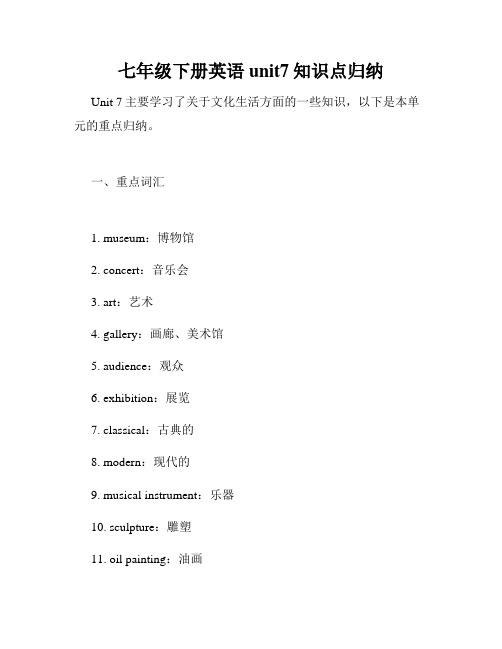
七年级下册英语unit7知识点归纳Unit 7主要学习了关于文化生活方面的一些知识,以下是本单元的重点归纳。
一、重点词汇1. museum:博物馆2. concert:音乐会3. art:艺术4. gallery:画廊、美术馆5. audience:观众6. exhibition:展览7. classical:古典的8. modern:现代的9. musical instrument:乐器10. sculpture:雕塑11. oil painting:油画12. watercolor:水彩画二、重点句型1. What can/should we do in a museum/art gallery?在博物馆/美术馆里,我们能/应该做什么?2. When does the concert start?音乐会什么时候开始?3. What kind of music do you like to listen to?你喜欢听什么样的音乐?4. I prefer classical music to modern music.我更喜欢古典音乐而不是现代音乐。
5. Do you play any musical instrument?你会演奏任何一种乐器吗?6. The exhibition is about Chinese culture.这次展览是关于中国文化的。
7. This sculpture is made of stone.这件雕塑是用石头制作的。
8. I think oil painting is more colorful than watercolor.我认为油画比水彩画更有色彩。
三、重点语法1. 物主代词的用法物主代词用于表示主人公对所拥有的人、事、物的表示,常用的物主代词包括my、your、his、her、its、our、their。
例句:This is my concert. 我的音乐会。
初一英语下册Unit7 知识点归纳
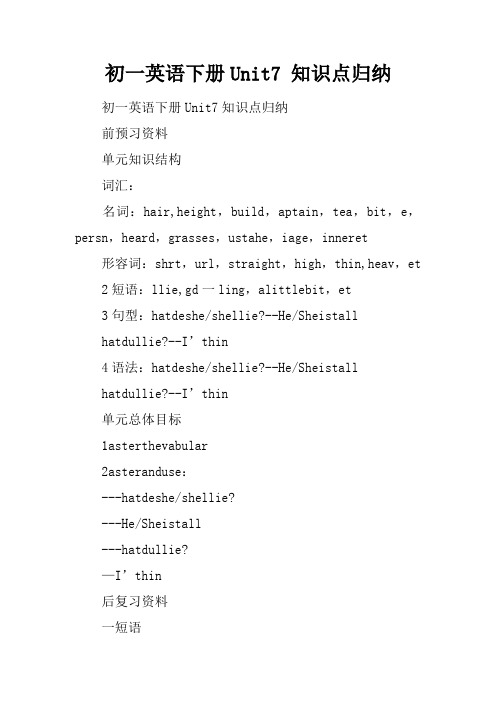
初一英语下册Unit7 知识点归纳初一英语下册Unit7知识点归纳前预习资料单元知识结构词汇:名词:hair,height,build,aptain,tea,bit,e,persn,heard,grasses,ustahe,iage,inneret 形容词:shrt,url,straight,high,thin,heav,et 2短语:llie,gd一ling,alittlebit,et3句型:hatdeshe/shellie?--He/Sheistallhatdullie?--I’thin4语法:hatdeshe/shellie?--He/Sheistallhatdullie?--I’thin单元总体目标1asterthevabular2asteranduse:---hatdeshe/shellie?---He/Sheistall---hatdullie?—I’thin后复习资料一短语1llie看起来像2url/shrt/straight/lnghair卷/短/直发3ediuheight/build中等高度/身体4alittlebit一点儿…appsinger一位流行歌手6haveanel呈现新面貌7gshpping去购物8theaptainfthebasetballtea 篮球队队长9beppularithsb为---所喜爱10nef------中的一个11stptdsth停下来去做某事12stpdingsth停止正在做的事情13telles/stries讲笑话/讲故事14havefundingsth愉快地做某事1reebertdsth记得做某事16reeberdingsth记得做过某事二本单元的重点句:1Isthaturfriend?N,itisn’t2hatdesshellie?3IthinInher4angLinistheaptainfthebasetballtea She’salittlebitquiet6XuQianlvesttelles7Sheneverstpstaling8Sheliesreadingandplainghess9Idn’tthinhe’ssgreat10Iangshppingandnbdnse11Nhehasanel三重难点解析1hatdes/d+主语+llie?询问某人的外貌特征,看上去什么样?Eg:hatdesurfriendllie?2形容头发时,可按照先长短,后曲直,最后说颜色的顺序说。
人教版七年级英语下册Unit7知识点与练习

人教版七年级英语下册Unit7知识点与练习Unit 7: Weather and ParksIn this unit。
we will learn some important words related to weather and parks。
These words will help us to talk about the XXX.Important Words:XXX: the n of the XXX.Park: a public area with grass。
trees。
and often playgrounds or sports fields.Message: a piece of n or news.Problem: XXX.Cook: XXX it.Could: past tense of "can," meaning to be able to do something.Windy: having a lot of wind.Cloudy: having a lot of clouds in the sky.Sunny: having a lot of sunshine.Bad: not good。
poor quality.Back: to return to the original place or n.Rain: water that falls from the sky in drops.Snow: XXX from the sky in flakes.Canada: a country in North America.Summer: the season een spring and XXX.Juice: XXX.n: a d of time when someone is not working or studying. Visit: to go and see someone or something.Sit: to be in a XXX.Dry: not wet。
人教英语七年级下册unit7Itsraining复习课件
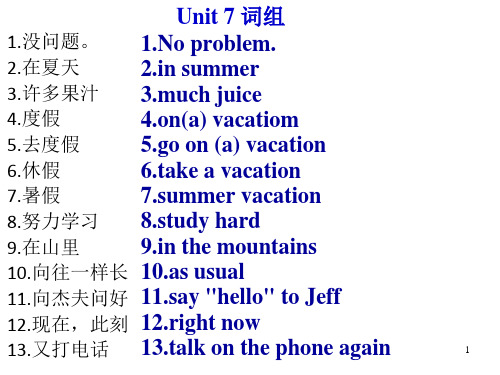
How is the weather in …? What is the weather like in …?
sunny. cloudy. It’s windy. raining/rainy. snowing/snowy.
5
6. How’s it going? 最近怎么样?最近好不好? 后可接with sb/ sth.用来表达对朋友、 家人的关怀。如:
14.拜访我姑姑 14.visit my aunt 15.参观长城 15.visit the Great Wall 16.一些俄罗斯人 16.some Russians 17.开心地干某事 17.have fun doing sth. 18.坐在池塘边 18.sit by the pool 19.我和我的家人 19.my family and I
30.尽快给我写信 30.write to me soon
31.买俄式面包带回家 31.buy Russian bread to take home
32.最近怎么样? 32.How's it going?
33.给雪人照相
33.take a photo of a snowman
34.听起来像---
34.sound like---
__H_o__w__’s_ the weather today?
13
Unit 7┃ 易错点针对训练 3. How clever the girl is!
_W___h_a_t__a clever girl she is!
Ⅳ.用所给词的适当形式填空 1. —Shall we go fishing this afternoon?
┃语法探究┃ Ⅰ.有关天气的表达:
询问天气的句型: How's the weather? = What's the weather like?
人教版英语-七年级-下册-unit-7-第七单元知识点

Unit 7 It's raining1、raining 下雨(1)rain 动词,“下雨”名词(不可数),“雨水,雨"例:There is a lot of rain here in summer。
形容雨大时,用heavy(2)rainy 形容词,“下雨的”(3)表示下雨时:There is rain in Beijing.It is raining in Beijing。
It is rainy in Beijing。
(4)snow/snowy2、How is the weather in Shanghai?(1)How is the weather?用来询问天气状况.=What is the weather like?在句末加“介词+地点/时间”等短语.(2)weather不可数名词,“天气”,不与不定冠词a/an连用。
whether是否3、cloud名词,“多云”,cloudy形容词,“多云的”.sun名词,“太阳”,sunny形容词,“晴朗的”。
fog名词,“雾”,foggy形容词,“多雾的"。
4、cook不及物动词,“做饭"及物动词,“煮,烹调",其后可接双宾语,cook sb。
sth。
=cook sth。
for sb.名词,“厨师,炊事员"cooker 名词,“厨具”cooking名词,“烹饪,做饭" do some cooking “做饭"5、How is it going?用来询问对方处境或事情进展的习惯语,相当于“近况如何?",后接介词短语with sb。
/sth。
同义句:How is everything?=How are things going?=How are you getting on?回答:Pretty good!/Great!/Not (too/so)bad!还不错/Just so so一般般/Terrible6、Sounds like you are having a good time。
Unit7知识归纳人教版七年级英语下册
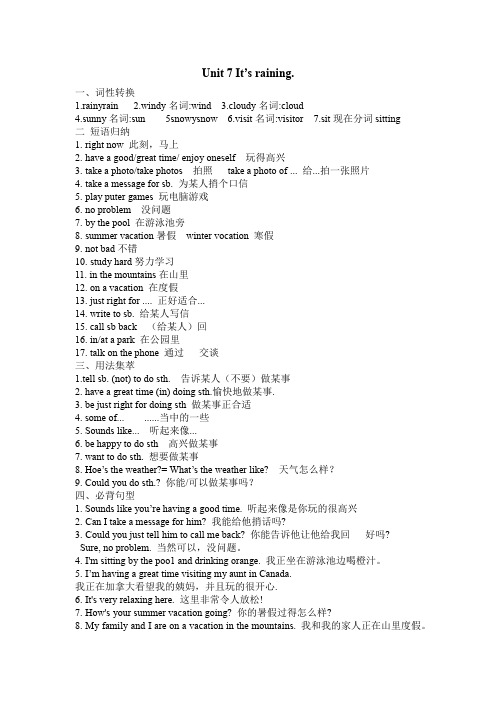
Unit 7 It’s raining.一、词性转换1.rainyrain2.windy名词:wind3.cloudy名词:cloud4.sunny名词:sun 5snowysnow 6.visit名词:visitor 7.sit现在分词sitting二短语归纳1.right now 此刻,马上2.have a good/great time/ enjoy oneself 玩得高兴3.take a photo/take photos 拍照take a photo of ... 给...拍一张照片4.take a message for sb. 为某人捎个口信5.play puter games 玩电脑游戏6.no problem 没问题7.by the pool 在游泳池旁8.summer vacation暑假winter vocation 寒假9.not bad不错10.study hard努力学习11. in the mountains在山里12. on a vacation 在度假13. just right for .... 正好适合...14. write to sb. 给某人写信15. call sb back (给某人)回16. in/at a park 在公园里17. talk on the phone 通过交谈三、用法集萃1.tell sb. (not) to do sth. 告诉某人(不要)做某事2. have a great time (in) doing sth.愉快地做某事.3. be just right for doing sth 做某事正合适4. some of... ......当中的一些5. Sounds like... 听起来像...6. be happy to do sth 高兴做某事7. want to do sth. 想要做某事8. Hoe’s the weather?= What’s the weather like? 天气怎么样?9. Could you do sth.? 你能/可以做某事吗?四、必背句型1. Sounds like you’re having a good time. 听起来像是你玩的很高兴2.Can I take a message for him? 我能给他捎话吗?3.Could you just tell him to call me back? 你能告诉他让他给我回好吗?Sure, no problem. 当然可以,没问题。
七年级英语下册unit7知识点

七年级英语下册unit7知识点Unit 7 of seventh grade English textbook focuses on describing past events and situations using the past simple tense. It also introduces some useful expressions to describe past experiences and offers opportunities for students to learn and practice using the target language. Here are the main knowledge points covered in Unit 7:1. Past Simple TenseThe past simple tense is used to describe finished actions, situations or events that happened at a specific time in the past. It is formed differently depending on the verb type:Regular verbs: add -ed to the base form of the verb (e.g. walk - walked, watch - watched)Irregular verbs: the past tense is formed in various ways, some verbs have different spelling, some use the same word as the base form (e.g. go - went, eat - ate)Negative sentences are formed using the auxiliary verb "did" in the past simple and the base form of the main verb (e.g. I didn't eat breakfast this morning.)Questions are formed using the auxiliary verb "did" and the base form of the main verb (e.g. Did you watch the TV last night?)2. Time expressionsIn order to give more precise information about when an event happened, certain expressions are used such as:Yesterday, the day before yesterday, last week, last month, last year, two days ago, ten minutes ago3. Useful expressions to describe past experiencesTo describe past experiences, some useful expressions can be used, including:I had a great time, it was fantastic/amazing, I enjoyed myself, It was fun, I loved it4. Listening and speaking practiceIn Unit 7, students have the opportunity to listen to and speak about past events using the past simple tense. They are guided through a series of activities that involve listening to people describe their past experiences and then sharing their own. Students are encouraged to use new vocabulary and expressions they have learned to describe their experiences.5. Reading and writing practiceIn the reading and writing section, students are asked to read a short story and answer comprehension questions, as well as write a paragraph about a personal experience. This provides students with an opportunity to practice their reading and writing skills, as well as using the target language to describe past events.ConclusionUnit 7 of the seventh grade English textbook provides students with a useful and practical introduction to using the past simple tense to describe past events and experiences. By practicing listening, speaking, reading, and writing, students will be able to gain the confidence and skills necessary to communicate effectively in English.。
unit7七年级下册知识点
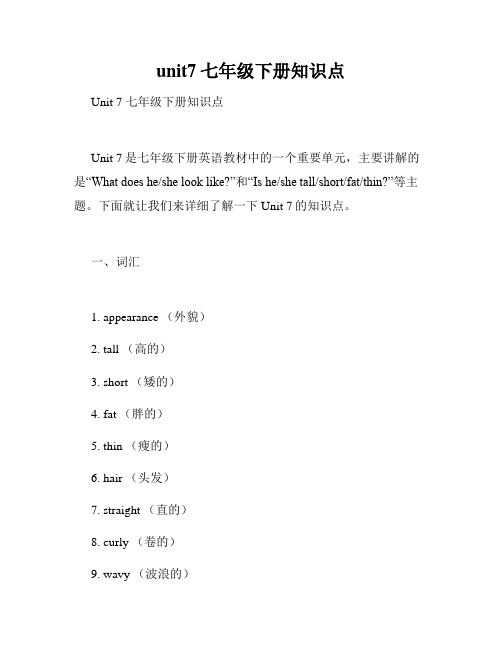
unit7七年级下册知识点Unit 7 七年级下册知识点Unit 7是七年级下册英语教材中的一个重要单元,主要讲解的是“What does he/she look like?”和“Is he/she tall/short/fat/thin?”等主题。
下面就让我们来详细了解一下Unit 7的知识点。
一、词汇1. appearance (外貌)2. tall (高的)3. short (矮的)4. fat (胖的)5. thin (瘦的)6. hair (头发)7. straight (直的)8. curly (卷的)9. wavy (波浪的)10. long (长的)11. short (短的)12. face (脸)13. oval (卵形的)14. round (圆形的)15. complexion (肤色)16. fair (公平的)17. dark (深色的)18. eyes (眼睛)19. blue (蓝色的)20. brown (棕色的)21. green (绿色的)22. nose (鼻子)23. mouth (嘴巴)24. teeth (牙齿)二、语法1. be动词的肯定形式例如:She is tall.(她高高的。
)2. be动词的否定形式例如:He is not short.(他不是矮矮的。
)3. be动词的一般疑问句形式例如:Is she fat?(她胖吗?)4. be动词的简略回答例如:- Is he tall? - Yes, he is. / No, he isn't.(- 他高吗?- 是的,他是。
/ 不是,他不高。
)5. 比较级和最高级例如:She is taller than me.(她比我高。
)She is the tallest in her class.(她班上最高。
)三、句型1. What does he/she look like?例如:What does he look like?(他长什么样子?)2. Is he/she tall/short/fat/thin?例如:Is she fat?(她胖吗?)3. He/She has...(他/她有...)例如:She has long curly hair.(她有长卷发。
七年级下册英语7单元知识点
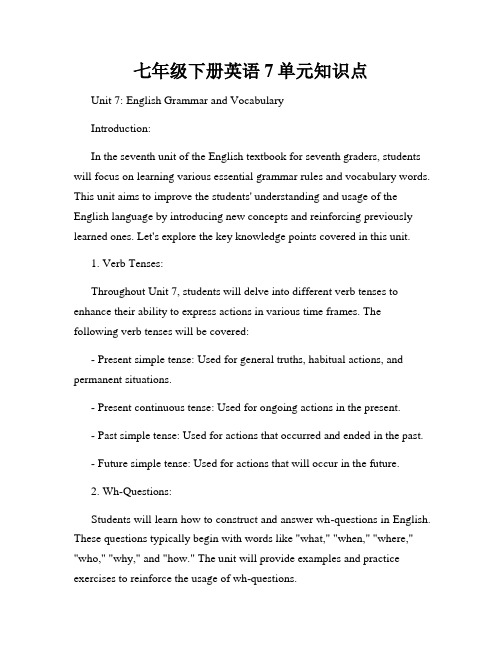
七年级下册英语7单元知识点Unit 7: English Grammar and VocabularyIntroduction:In the seventh unit of the English textbook for seventh graders, students will focus on learning various essential grammar rules and vocabulary words. This unit aims to improve the students' understanding and usage of the English language by introducing new concepts and reinforcing previously learned ones. Let's explore the key knowledge points covered in this unit.1. Verb Tenses:Throughout Unit 7, students will delve into different verb tenses to enhance their ability to express actions in various time frames. The following verb tenses will be covered:- Present simple tense: Used for general truths, habitual actions, and permanent situations.- Present continuous tense: Used for ongoing actions in the present.- Past simple tense: Used for actions that occurred and ended in the past.- Future simple tense: Used for actions that will occur in the future.2. Wh-Questions:Students will learn how to construct and answer wh-questions in English. These questions typically begin with words like "what," "when," "where," "who," "why," and "how." The unit will provide examples and practice exercises to reinforce the usage of wh-questions.3. Adverbs of Frequency:In this unit, students will gain an understanding of adverbs of frequency, which indicate how often an action occurs. Adverbs such as "always," "often," "sometimes," "rarely," and "never" will be explored. Students will learn how to use these adverbs to describe routines and habits.4. Comparative and Superlative Forms:The comparative and superlative forms of adjectives will be introduced. Students will learn how to compare and rank items or people using words like "bigger," "better," "more beautiful," "the most interesting," and so on.5. Vocabulary:Unit 7 will expand students' vocabulary by introducing new words and phrases related to various topics. Vocabulary words may include professions, hobbies, sports, food, transportation, and more. Students will practice using these words in sentences to enhance their vocabulary and communication skills.Conclusion:In Unit 7 of the seventh-grade English textbook, students will delve into important grammar rules and expand their vocabulary. From verb tenses and wh-questions to adverbs and comparative forms, students will acquire new knowledge and master essential language skills. By studying the content provided and completing practice exercises, students will enhance their understanding and usage of the English language, making significant progress in their language learning journey.。
- 1、下载文档前请自行甄别文档内容的完整性,平台不提供额外的编辑、内容补充、找答案等附加服务。
- 2、"仅部分预览"的文档,不可在线预览部分如存在完整性等问题,可反馈申请退款(可完整预览的文档不适用该条件!)。
- 3、如文档侵犯您的权益,请联系客服反馈,我们会尽快为您处理(人工客服工作时间:9:00-18:30)。
七年级下册Unit 7 复习资料
一,词汇
1.rain 不可数名词,雨水/v.动词,下雨
It’s raining hard. Can’t you feel the rain on your face?
2.snow 不可数名词,雪/ v.下雪
There is much snow here. Let’s make a snowman after it stops snowing.
3.good(反义词)____________ cold(反)_____________ warm(反)_____________
problem(近义词)__________________ snowman(复数)______________
rain(形容词)_______________ wind(形)______________ cloud (形)_____________
sun(形)_________________snow(形)_________________ health(形)_____________
Luck(形)_______________ noise(形)_________________can(过去式)____________
America(形)_____________ Russia(形)_______________
二.句子
1.北京的天气如何?____________________________________________________?
Or _____________________________________________________?
2.这是Rick 打来的电话_____________________________________________________.
3.你近况如何?_______________________________________________________?
4.我能为他捎个口信吗? ______________________________________________________?
5.你能叫他给我回个电话? _______________________________________________________?
6.我正愉快地拜访在加拿大的姑姑。
_____________________________________________________________________________.
7.你在刻苦学习吗?_____________________________________________________?
8.此刻,在你的国家天气很炎热,不是吗?
____________________________________________________________________________?
9.今天的天气正适合步行。
_______________________________________________________.
10.一个男人正在拍雪人照。
_______________________________________________________.
11.能叫Laura接电话吗? _________________________________________________________?
12.我的电脑坏了。
____________________________________________.
三.补全对话
A:Hello!Who’s that?
B:Hi,Kate!This is Kelly,
A:Oh,Kelly! 1________________________________________?
B:I’m in London.伦敦
A:Really? 2__________________________________________ there?
B:I’m visiting my sister.
A:3___________________________________________?
B:Not bad.What about you?
A:Very good. 4_________________________________________?
B:Because my sister is teaching in London.
A:5__________________________________?
B:It’s sunny and warm.
四.用所给单词的适当形式填空
1.It’s best to read books at home on __________ (rain) days.
2.Could you ___________(calling) me back soon?
3.My mother is __________(sit) on the sofa to drink tea.
4.Look!They _______________(study) in the classroom.
5.What’s Tom doing?He ______________(play) soccer. He _________(play) soccer every Saturday.
6.He goes to over 10 ___________(country) for vacation every year.
7.Jack’s having a great time __________(shop) at the supermarket.
五.根据汉语提示完成句子
1.I’m from __________(俄罗斯).I’m a ____________(俄罗斯的) boy.I speak __________(俄罗斯语) well.
2.The ___________(雪人) are made of snow.
3.She has fun ______________(烹调) dinner.
4.What’s your __________(问题)? I have no friends.
六.单项选择
( )1.Look at the _____!It’s _________ hard now.
A.rain, rain
B.raining,raining
C.rain,raining
( )2.-Could you help me?-_________.
A.Yes,I could
B.No,I could not
C.Sure,no problem
D.Yes,I can
( )3.My parents often tell me __________ my homework.
A.do
B.does
C.doing
D.to do
( )4.We have a great time _______ English.
A.learns
B.learn
C.learning
( )5.Please call _________.
A.back me
B.back I
C.me back
( )6.Tom _________ his father and his father_______ young.
A.looks,looks like
B.looks like,looks
C.looks like,looks like
D.looks,looks
( )7.____ students learn ________ from the summer school.
A.Lots of,lots of
B.A lot of,a lot
C.A lot,a lot
D.A lot of ,a lot of
( )8.He likes to eat ________ food.
A.Russia
B.American
C.America
D.Europe
( )9.How’s it going?-__________.
A.Not bad
B.It’s windy
C.It’s boring
D.That sounds good.
请根据表格里的内容写一篇书面表达,描述四人的相关情况
_______________________________________________________________________________ _______________________________________________________________________________ _______________________________________________________________________________ _______________________________________________________________________________ _______________________________________________________________________________ _____________________________________________________________________________.。
